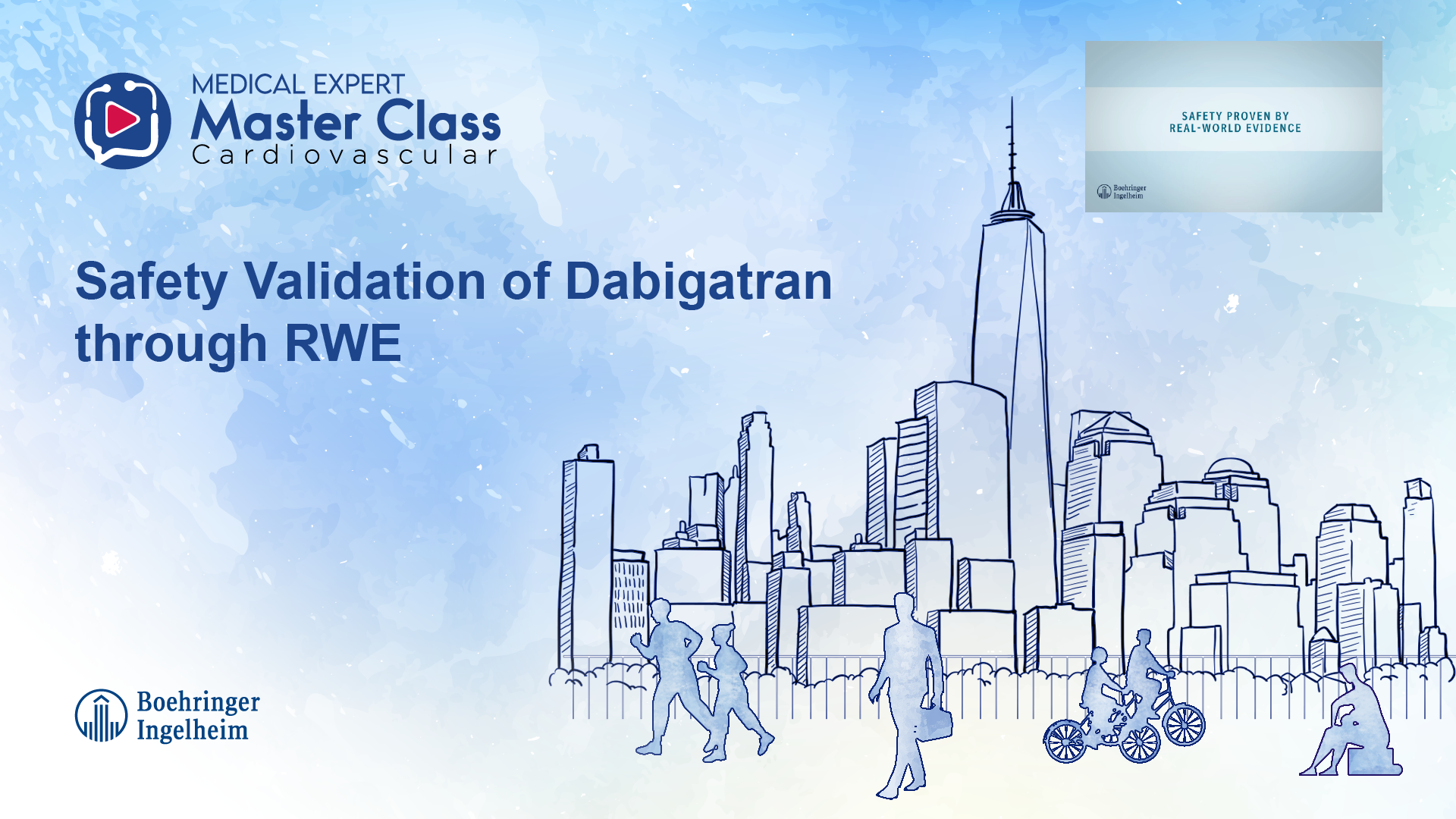
Use of anticoagulation for stroke prevention is associated with high risk of bleeding in elderly. Dr. John W. Eikelboom provides insights from the RE-LY sub analyses which assessed patients with moderate renal impairment for the risk of ICH and stroke or systemic embolism when treated with both doses of dabigatran versus warfarin. RE-LY analyses showed decline in renal function over time in patients receiving warfarin or dabigatran indicating that renal function does not decide the choice of anticoagulation.

Cardiovascular
 RE-DUAL PCI: Triple and Dual Antithrombotic Therapy Post PCI
RE-DUAL PCI: Triple and Dual Antithrombotic Therapy Post PCI
Triple antithrombotic therapy with warfarin is the standard of care in AF patients undergoing PCI, but this is associated with a high risk of bleeding. RE-DUAL PCI study compared trial triple therapy with warfarin and dual therapy with dabigatran post-PCI in patients with AF. Some important differences observed in primary and secondary end points have been shown here.
 RE-DUAL PCI, ESC 2017: Dr. Christopher Cannon
RE-DUAL PCI, ESC 2017: Dr. Christopher Cannon
Dr. Cannon CP shares the results from RE-DUAL PCI that compared dual therapy with dabigatran versus triple therapy with warfarin. Evaluation of primary and secondary end points yielded vital data on safety and efficacy outcomes with these anticoagulants. Dual therapy with dabigatran was found to be as effective as triple therapy with warfarin in managing overall thromboembolic events.
 RE-DUAL PCI, ESC 2017: Q&A with Dr. Christopher Cannon
RE-DUAL PCI, ESC 2017: Q&A with Dr. Christopher Cannon
This Q&A with Dr. Christopher P. Cannon discusses relevant implications of the RE-DUAL PCI study results in considering dual therapy with dabigatran and triple therapy with warfarin in managing AF patients post PCI.
 Setting New Standards for Patients in AF - RE-DUAL PCI - Georg Nickenig
Setting New Standards for Patients in AF - RE-DUAL PCI - Georg Nickenig
Anticoagulation in atrial fibrillation have come a long way as Dr. Georg Nickenig shares treatment options for patients undergoing and post-PCI. The 2018 ESC expert consensus recommends discharging patients on triple therapy or dual therapy on concerns of thromboembolic events or bleeding risks respectively. Here, Dr. Georg Nickenig shares imperative evidences from recent studies that show a shift towards dual therapy post PCI/post ACS in patients with NVAF.
 Setting New Standards for Patients with AF - Anticoagulation Academy 2019 Barcelona Q&A
Setting New Standards for Patients with AF - Anticoagulation Academy 2019 Barcelona Q&A
This Q&A deals with setting new standards for patients with AF - AC 2019 Barcelona with the panel Dr. Marc Brouwer, Dr. Elaine Hylek, Dr. Georg Nickenig and Dr. Todd Villnes along with hosts Dr. John Eikelboom and Dr. Harry Buller.
 RE-DUAL PCI : Safety and Efficacy of Two Regimens of Dual Therapy with Dabigatran without ASA
RE-DUAL PCI : Safety and Efficacy of Two Regimens of Dual Therapy with Dabigatran without ASA
Dr. Dominick Angiolillo opines that AF patients undergoing PCI need protection from stroke. He shares the results of RE-DUAL PCI trial comparing dabigatran dual therapy versus warfarin triple therapy, to help physicians make better informed choices and minimize the risk of bleeding and mortality.
 RE-DUAL PCI: Subgroup Analysis on baseline PPI use in post PCI
RE-DUAL PCI: Subgroup Analysis on baseline PPI use in post PCI
Use of PPI to reduce the risk of bleeding can affect the absorption of other drugs post PCI in patients with atrial fibrillation. The RE-DUAL PCI sub-analysis provides insights of the impact of baseline PPI on safety endpoints when tested with both the doses of dabigatran versus triple therapy.
 RE-DUAL OAC switching subanalysis animated video
RE-DUAL OAC switching subanalysis animated video
AF patients undergoing PCI already on oral anticoagulant (OAC) therapy may need to switch to a different OAC for a variety of reasons. Switching OAC therapies can result in increased risk of bleeding and thromboembolic complications particularly in post PCI setting. The results from RE-DUAL PCI sub-group analysis prove otherwise. The RE-DUAL PCI sub-group analysis reassures safe switch to both doses of dabigatran in post PCI setting irrespective of prior OAC or warfarin use.
 Setting New Standards for Patients in AF - Anticoagulation Academy 2019 Barcelona - RE-CIRCUIT
Setting New Standards for Patients in AF - Anticoagulation Academy 2019 Barcelona - RE-CIRCUIT
Dr. Marc Brouwer takes on the clinical data of uninterrupted dabigatran versus warfarin in periprocedural AF ablation from the RE-CIRCUIT trial and goes on to compare with the results from VENTURE-AF, AXAFA-AFNET 5 trial using other NOACs. He also shares the current guidance for the management of bleeding and cardiac tamponade from anticoagulation therapy.
 RECIRCUIT: Uninterrupted Anticoagulation with Dabigatran in Catheter Ablation
RECIRCUIT: Uninterrupted Anticoagulation with Dabigatran in Catheter Ablation
The RE-CIRCUIT trial provides insights on the safety profile of uninterrupted dabigatran compared to uninterrupted warfarin in nonvalvular atrial fibrillation (NVAF) patients undergoing catheter ablation.

A stroke can create long-term challenges for patients and caregivers. Novel oral anticoagulants help in the prevention of stroke in patients with atrial fibrillation. In cases when patients are for emergency procedure like IV thrombolysis for ischemic stroke and are on dabigatran, it is always reassuring to know that reversibility of NOAC effect is possible to proceed with contemplated procedure. Professor Dr. Martin Grond opines on managing such critical situations with a specific reversal agent like idarucizumab.

Cardiovascular
 #2 Reversibility : Neurologist's perspective
#2 Reversibility : Neurologist's perspective
Professor Dr. Martin Grond shares his clinical experience about a patient with TIA and brain hemorrhage. He shares his practice experience on the possibility of controlling hematoma growth in patients taking anticoagulants with a specific antidote.
 #3 Reversibility : Neurologist's perspective
#3 Reversibility : Neurologist's perspective
Professor Dr. Martin Grond describes idarucizumab, its mode of action and method of administration and elaborates how this reversal agent can provide value to dabigatran treated patients undergoing emergency surgery or with life-threatening bleeding.
 #4 Reversibility : Neurologist's perspective
#4 Reversibility : Neurologist's perspective
In patient on effective anticoagulation therapy, suffering from an ischemic stroke, is thrombolysis possible? Know it better from Professor Dr. Martin Grond.
 #5 Reversibility : Neurologist's perspective
#5 Reversibility : Neurologist's perspective
During urgent interventions, normalizing coagulation values is a crucial step. Professor Dr. Martin Grond emphasizes the administration of idarucizumab in patients undergoing emergency surgeries, as he shares his experience with the drug.
 #6 Reversibility : Neurologist's perspective
#6 Reversibility : Neurologist's perspective
The availability of specific reversal agent can change lives of people on anticoagulation therapy. Idarucizumab is the specific reversal agent for dabigatran that can be utilized as a rescue strategy in clinical scenarios of life-threatening bleeding and urgent surgical or medical intervention. Given his in-clinic experiences, Professor Dr. Martin Grond couldn’t agree more.
 #1 Reversibility : Cardiologist's perspective
#1 Reversibility : Cardiologist's perspective
Use of direct oral anticoagulants has bridged the need for effective anticoagulation in patients with atrial fibrillation. Professor Anna Tomaszuk-Kazberuk throws light on the efficacy and safety of direct oral anticoagulants and use of idarucizumab to reverse their anticoagulant effect, when needed.
 #2 Reversibility : Cardiologist's perspective
#2 Reversibility : Cardiologist's perspective
Professor Anna Tomaszuk-Kazberuk discusses a case where cardiac surgeons initially refused to operate a patient on anticoagulant treatment and how idarucizumab has paved the way for proceeding with the contemplated procedure.
 #3 Reversibility : Cardiologist's perspective
#3 Reversibility : Cardiologist's perspective
Professor Anna Tomaszuk-Kazberuk elaborates on how the use of idarucizumab changed the opinion of cardiac surgeons from withholding an emergency procedure for an imminent life-threatening condition to performing the same, while the patient was on dabigatran.
 #4 Reversibility : Cardiologist's perspective
#4 Reversibility : Cardiologist's perspective
An elderly lady who had previous stroke and maintained on dabigatran had massive bleeding from her genital tract, as seen by her gynecologist. Professor Anna Tomaszuk-Kazberuk tells us how idarucizumab served as her rescue drug.
 #5 Reversibility : Cardiologist's perspective
#5 Reversibility : Cardiologist's perspective
There are circumstances that may need for emergency reversal of anticoagulation in order to save lives of patients. Professor Anna Tomaszuk-Kazberuk deliberates on the use of idarucizumab by citing different clinical scenarios which were successfully managed with administration of idarucizumab based on her clinical experience.
 Role of Idarucizumab in Neuro-Thrombolysis
Role of Idarucizumab in Neuro-Thrombolysis
Prof. Dr. med. Martin Grond provides a neurologist’s perspective on the reversibility of NOAC therapies and in specific about reversing dabigatran anticoagulant effects using idarucizumab in life threatening emergency situations like ischemic stroke and ICH, based on a retrospective study and real-world experience.
 Idarucizumab Mechanism of Action
Idarucizumab Mechanism of Action
DOACs carry a risk of bleeding as with all antithrombotic therapies. A humanized monoclonal antibody was developed to reverse dabigatran anticoagulant effects in rare emergency situations. Let us see the mechanism of action of this antidote, idarucizumab.

Results from RCTs strengthened by real-world evidences can immensely support clinical decision making. The safety and efficacy of dabigatran is studied in a broad patient population across different clinical settings.

Cardiovascular
 Safety Validation of Dabigatran through RWE
Safety Validation of Dabigatran through RWE
The safety profile of dabigatran is built on evidences from RCTs and comprehensive data from real-world studies; together these provide information to the medical practitioners about its safety compared to VKAs and other NOACs.
 Complimentary Role of Phase 3 data and Dabigatran RWE by Gregory Lip
Complimentary Role of Phase 3 data and Dabigatran RWE by Gregory Lip
Professor Gregory Lip compares the approach behind conducting randomized clinical trials and real-world studies for medical intervention. He also elaborates on how real-world evidence on dabigatran therapy has provided supportive and complimentary data to RCTs and contributed to improved patient outcomes.
 GLORIA AF Real World Evidence Study
GLORIA AF Real World Evidence Study
'50 countries, 5 regions, 2200 sites': GLORIA AF – one of the largest prospective RWE study, and provides long term comparative real-world outcomes of oral anticoagulants for AF.

A yearly Speakers Meeting that discusses the Advances in anticoagulation care, the complimentary Value of Real World Evidence to Phase III Clinical trial data of Dabigatran and the Essential role of Reversal Agents like Idarucizumab in the management of SPAF patients.

Cardiovascular
 Regional Anticoagulation Speaker Medical Forum 2021
Regional Anticoagulation Speaker Medical Forum 2021
The medical speaker forum for stroke prevention in atrial fibrillation 2021 aimed to discuss the latest development in the field of anticoagulation and updates in the use of specific reversal agents for patients on NOAC. The meeting provided a platform to discuss with Regional Medical Experts how this latest clinical data impacts current clinical practice within the ASEAN and SK region with the aim of ensuring the appropriate use of NOACs for better patient care. It is also provided opportunity for sharing Patient Cases and how current data supports the use of NOACs for the right patient at the appropriate dose.
 Atrial Fibrillation Management-From Clinical Evidence to Real World Practice - Prof. Gregory Lip
Atrial Fibrillation Management-From Clinical Evidence to Real World Practice - Prof. Gregory Lip
Professor Gregory Lip highlights the benefits of dabigatran (NOACs) for AF patients requiring anticoagulation therapy while citing evidence from some key clinical trial studies and real-world data of dabigatran showing a significant relative risk reduction in ischemic stroke, systemic embolism, intracranial hemorrhage and all-cause mortality when compared to OACs or other NOACs. The availability of idarucizumab, a specific dabigatran reversal agent adds greater control and is an important factor in oral anticoagulation therapy.
 CV Anticoagulation Webinar April 2021
CV Anticoagulation Webinar April 2021
The Anticoagulation Webinar is entitled Clinical Trial Data, AF Guidelines and Real World Evidence in SPAF discusses the developments in the field of anticoagulation care, latest available Guidelines in SPAF appreciation of Current Phase 3 data and Real World Evidence in SPAF. The meeting provided a platform to discuss how clinical evidences, updated clinical practice Guidelines in AF and Individual Risk factors are important considerations in the safe and appropriate use of NOACs for SPAF.


